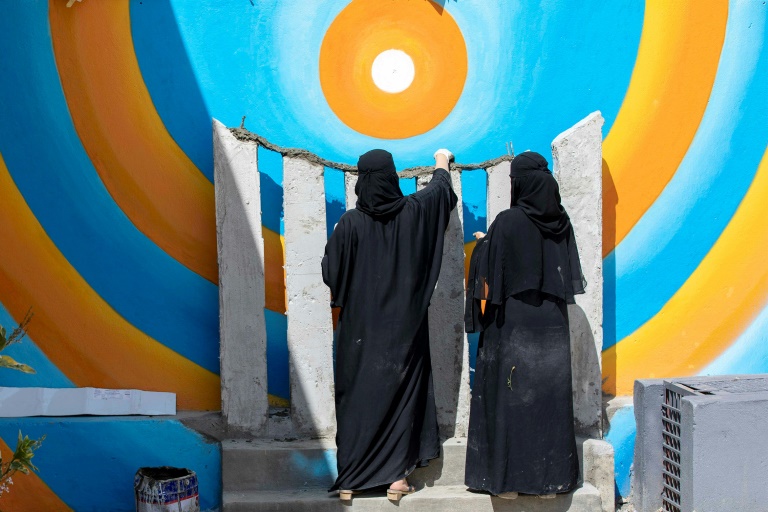Yemen’s women chafe under tightening Huthi restrictions

Yemeni society, although deeply conservative, has traditionally allowed space for individual freedoms
Dubai – Yemeni student Abir al-Maqtari dreamt of studying abroad but amid a tightening of restrictions on women echoing religious regimes in Iran and Afghanistan, Huthi forces blocked her from leaving.
The Iran-backed Huthis, who have controlled swathes of the Arab world’s poorest country since seizing the Yemeni capital Sanaa in 2014, have increasingly enforced travel restrictions on women over the past eight months, residents and activists say.
Maqtari, 21, from Yemen’s southwestern city of Taez, was ready to study in Egypt — but she was barred from leaving Sanaa airport without a male guardian.
“I got a scholarship in Cairo, but the Huthis didn’t let me travel through (Sanaa) airport,” she said.
“I then thought I could try to travel via the airport in (government-held) Aden, but the Huthis also stopped me from reaching it,” she added.
Yemeni society, although deeply conservative, has traditionally allowed space for individual freedoms. But this is changing under the Huthi movement, which was founded with the aim of pushing for a theocracy.
Recently the Huthis clamped down on women travelling without a “mahram” — or male relative — even within the country. Women in the rebels’ northwestern stronghold of Saada are denied contraception if they don’t have a prescription and their husband isn’t present.
In Saada and some small towns, women cannot travel alone after dark, even for medical emergencies, while an all-female police force called the “Zainabiyat” enforces discipline.
However, there are numerous examples of women complaining and pushing back, especially in the big cities.
“As a Yemeni woman, I feel that all my rights and my freedoms are being stolen from me,” Maqtari said.
– ‘Dangerous’ precedent –
The Huthis, from Yemen’s mountainous north, belong to the Zaidi minority, an offshoot of Shiite Islam that makes up more than a third of the fractured country’s Sunni-majority population.
The hardline force emerged in the 1990s, rising up over alleged neglect of their region.
It has been fighting a pro-government coalition led by powerful neighbour Saudi Arabia since 2015, a conflict that has left hundreds of thousands dead and millions on the brink of famine.
Restrictions on female freedoms, which parallel decrees issued by the fundamentalist Taliban in Afghanistan, are not part of Yemeni law and are enforced arbitrarily through rebel directives.
Radhya al-Mutawakel, co-founder of Yemeni rights group Mwatana, said the travel restrictions set a “very dangerous” precedent and disproportionately affect women who have jobs.
“This is the first time that a decision limiting the freedom of movement of women has come from an official authority,” Mutawakel said.
Bilqees al-Lahbi, a gender consultant at the Sanaa Center for Strategic Studies think tank, said the restrictions are aimed at satisfying the most extreme branch of the Huthi movement and exerting political control.
“They are inspired by both the Iranian model and that of the Taliban to silence all opposition and subjugate society,” she said.
– ‘Talibanise society’ –
But in major cities, residents are resisting “attempts to Talibanise society”, Mutawakel said, highlighting Sanaa’s younger and more defiant population.
Aicha Ahmed was forced to close her beauty salon and gym in Sanaa for months after the Huthis shut down swimming pools, fitness facilities and other businesses catering exclusively to women over the summer.
After repeated complaints and lobbying on social media she was permitted to reopen her salon, but not the gym.
“Eight employees lost their jobs,” she said.
In the western city of Hodeida, also under Huthi control, the owner of a cafe for women had to fight to stay in business.
“We told them that we were ready to respect all their conditions,” the 38-year-old said, requesting anonymity over security concerns.
In Sanaa, an outcry over prohibitions on men and women mixing at graduation ceremonies and in restaurants, as well as a ban on music during certain events, has forced the authorities to backtrack.
“But it’s a long-term battle,” Mutawakel said.
“We don’t know who will win… because in the end, the population is exhausted.”
